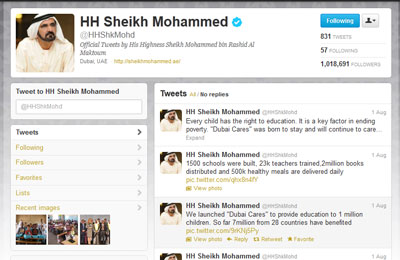
Twitter use by ME leaders on the rise
Dubai, August 8, 2012
Leaders in the Middle East are increasingly using Twitter as an effective tool to inform their people and engage with them, according to public relations consultancy Burson-Marsteller’s recent ‘Twiplomacy’ study.
It is the first-ever global study of world leaders on Twitter that researches 264 heads of state and their institutions in 125 countries of which 21 were from the Middle East and North Africa.
The study analyses their Twitter profiles, their tweet history and their connections with each other.
Twiplomacy shows that almost two-thirds of world leaders have a Twitter account. Active leaders who use Twitter in the region include HH Sheikh Mohammed Bin Rashid Al Maktoum, who has just crossed the 1 million mark in followers; HM Queen Rania Al Abdullah (2,222,872 followers); Tunisian President Moncef Marzouki (69,217 followers); Lebanese Prime Minister Najib Mikati (54,782 followers); Lebanese President Michel Sleiman (39,092 followers); Palestinian Prime Minister Dr Salam Fayyad (1,551 followers); Tunisian Prime Minister Hamadi Jebali (1,324 followers); and Iraqi Prime Minister Nouri Al Maliki (385 followers).
HH Sheikh Mohammed has 13 other world leaders following him, making him the most followed by leaders in the region. HM Queen Rania is the fourth most followed world leader (2,222,872 followers) preceeded by Barack Obama in first position (18,223,342 followers).
Venezuelan President Hugo Chávez is the second most followed leader (3,276,230 followers) followed by the account of the White House (3,002,147 followers).
Of the G20 countries, 16 have a presence on Twitter. The Saudi Arabian government has an official portal with a Twitter account @Saudiportal (2,615 followers).
The Twiplomacy study identifies Arabic as the fourth most used language amongst world leaders. English is the main language followed by Spanish and French. Leaders across the world tweet in a total of 43 different languages.
Thirty heads of state and government do their own tweeting. Amongst the Middle Eastern leaders, the most conversational is Lebanese Prime Minister Najib Mikati who personally engages with his 54,700+ followers. One-fifth of his tweets are replies and he regularly has one-hour long Twitter chats with his followers.
In November 2011, he organised a Twitter Q&A with UK Ambassador to Lebanon, @HMATomFletcher. Also, Lebanese president Michel Sleiman is one of the few heads of state that occasionally tweets himself, signing his personal tweets MS which are sent straight from his Blackberry.
“It is clear that leaders in the region have realised that social media is an effective tool to engage with their people,” said Sunil John, the CEO of ASDA’A Burson-Marsteller. “Our 2012 ASDA’A Burson-Marsteller Arab Youth Survey revealed that since the Arab Spring, nearly three-quarters of Middle East youth believe their government has become more trustworthy and transparent.”
“They saw the Arab Spring as a positive development and now feel greater optimism about the future. In that context, it is extremely encouraging to see leaders from the region use Twitter as a platform to disseminate information and communicate with their audience.”
The recently released Accenture Digital Citizen Pulse Survey affirms that social media is reinventing government communication. Nearly 51 per cent of the respondents from the global survey believe that the ability to interact digitally with the government will encourage them to be more engaged with government.
The Arab region has close to 2.1 million active Twitter users tweeting almost 4,000 tweets a minute, according to Dubai School of Government’s recent Arab Social Media Report. The top five Arab countries in terms of Twitter users are Egypt, Saudi Arabia, Kuwait, UAE and Lebanon. – TradeArabia News Service







